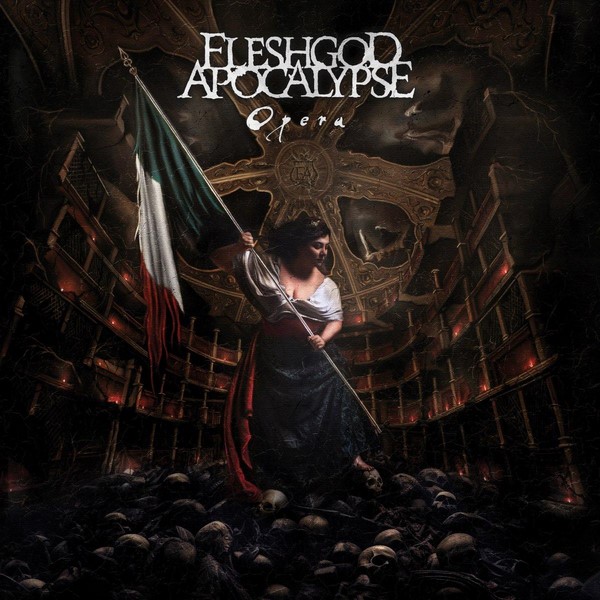When symphonic metal bands release album with “opera” in the title, you can bet it’s going to be one of their most ambitious albums, and Fleshgod Apocalypse doesn’t disappoint in that regard.
The intro, an opera ballad sung by Veronica Bordacchini, is called “Ode to Art”, and art seems to be one of the main themes of the album. The first full-length song, “I Can Never Die”, starting with guitars, choirs and a long scream from Francesco Paoli is about how, as long as you can create art, you’ll never truly die. That’s the kind of song topic I really like, just like I love its symphonic metal instrumentation. The chorus, with singing from both vocalist and furious drumming, is pretty good too.
Of course, death is the other main theme in the album, like on the heavy and sinister “Pendulum”, with its chorus about “Falling straight to fucking hell”, its heavy and repetitive riff, and alternating between Fransceso’s deeper growls and Veronica’s lyrical singing, which often reminds me of the call-and-responses between Dani and Sarah in early Cradle of Filth albums. I take this as a good sign. Meanwhile, “Bloodclock” is more about how “I’m not dead yet!”, and has a nice contrast between the soft piano intro and the sudden heavy riffs, or between Francesco’s whispers on the pre-chorus and his growls on the chorus.
Once again, Veronica sings the bridge in a lower, sort of eerie voice, similar to Sarah Jezabel Deva. Of course, she still sounds like herself, and despite occasional comparisons to Cradle of Filth, the album very much has a sound of its own. On the even more sinister “At War With My Soul”, she sings higher, more lyrical notes, adding a certain melancholy to the song, which sort of fits the creepy riff on the chorus. Her interventions are often the highlight of many songs. She’s a very good late addition to the band. Francesco can sound very good too, especially on “At War”, with his low growls and that sinister outro where he goes from speak-screaming to growling. His higher screams on “Morphine Waltz” are a nice touch too. The song doesn’t exactly use a waltz rhythm, but its crazy fast piano and drum intro is also very good, very Fleshgod Apocalypse.
The album has some other nice instrumental ideas, like the old-sounding recording at the beginning of “Matricide 8.21”, which then sounds like a more melodic and symphonic track, pretty catchy too. As usual, the operatic and harsh vocals are both a very good way to tell the story of a complicated mother and son relationship. There’s something special, rather mysterious and haunting about this song. “Per Aspera Ad Astra” is what you’d picture if I said “symphonic death metal” or “Fleshgod Apocalypse”, with its super-fast riff, mix of loud operatic vocals and growls, choirs, keyboards and violins.
Finally, “Till Death Do Us Part” is another great example of symphonic death metal, beginning as a ballad with opera vocals, with romantic and macabre lyrics, before adding growls and heavier riffs but keeping a sort of wistful tone, especially on its outro with Veronica’s sweet singing. The title track is a nice and gloomy piano ballad, ending this album and its beautiful mix of symphony and death metal. If you had to use one album to sum up Fleshgod Apocalypse’s current sound in a nutshell, it would be this one. It’s not too different from what you’d expect of this band, and in fact, it can feel a little repetitive at times, especially in riffs or vocal lines. But that’s the album’s only obvious flaw. It’s the Fleshgod sound we’ve come to know and love, a creative mix of symphony and heaviness, of darkness and beauty, with good instrumentations and vocals. It’s definitely something you will enjoy.
If you really would like to support Antichrist, you can just Share our article.
You can also support Antichrist by sending a couple bucks to cover some webhosting expenses. =>> PayPal




